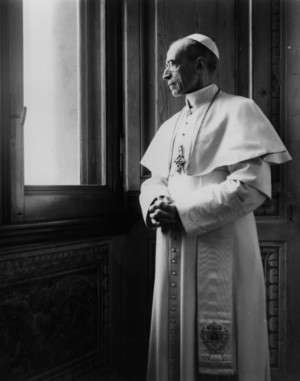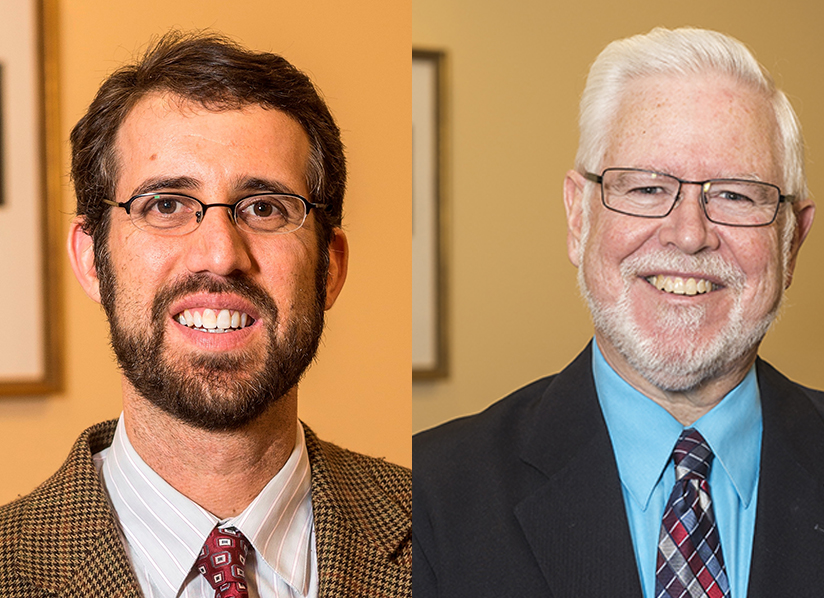
Pope Pius XII is pictured at the Vatican in a file photo dated March 15, 1949. (CNS file photo)
Unsealing documents on Pope Pius XII in the Vatican’s Secret Archives will not necessarily resolve whether the wartime pontiff sufficiently advocated for Jews during World War II, according to two local experts.
“The focus on Pius XII is understandable, but also somewhat excessive,” said Adam Gregerman, associate professor of Jewish studies at Saint Joseph’s University and the co-director of the school’s Institute for Jewish-Catholic Relations (IJCR).
Founded in 1967, the IJCR is the oldest university center of its kind in the U.S. created in response to the Second Vatican Council’s call for increased interfaith dialogue.
Both Gregerman and fellow IJCR director Professor Philip Cunningham applauded Pope Francis’ recent announcement that the material will be made available to scholars as of March 2, 2020. Archival staff at the Vatican have spent the past 13 years organizing the collection, whose 16 million pages include Vatican diplomatic documents and thousands of notes regarding Pope Pius XII’s activities.
Controversy has long marred the legacy of Pope Pius XII, whose 1939-1958 pontificate coincided with World War II, the Holocaust and postwar reconstruction. Six million Jews were systematically killed by Nazi Germany during the Holocaust, or Shoah, and Pope Francis acknowledged that his predecessor experienced “moments of tormented decisions … which to some could look like reticence.”
[hotblock]
“The Deputy,” a 1963 play by Rolf Hochhuth, portrayed the pontiff as cowardly and calculating in his stance on Nazi Germany and its attempts to exterminate all of Europe’s Jewish population.
After the play’s premiere, the Vatican ordered the publication of 11 volumes of Pius XII-related documents between 1965 and 1981. However, the material was criticized as incomplete, particularly with regard to the pontiff’s wartime activities.
Although their release has been “needed for several decades,” the remaining documents may not provide enough insight into Pope Pius XII’s personal perspective, said Cunningham.
“He didn’t keep a diary, and he wasn’t a guy to write personal letters very much,” said Cunningham, adding that diplomatic and episcopal correspondence will not fully enable “historians to get into the mind of Pope Pius XII and get a handle on what he was thinking.”
Gregerman noted that a more accurate historical analysis looks to the overall response of Christians to the Nazi persecution of Jews.

Professors Adam Gregerman (left) and Philip Cunningham (right) of the Institute for Jewish-Catholic Relations at St. Joseph’s applaud the Vatican’s release of documents on Pope Pius XII, but caution that the material will not fully resolve questions about the wartime pontiff’s response to the Holocaust. (Photos courtesy of St. Joseph’s University)
“The broad consensus is that both Catholic and Protestant churches with few exceptions did little or nothing to oppose the Nazis in their treatment of the Jews,” said Gregerman.
Contrary to some assessments, the postwar Second Vatican Council was not primarily convened to address longstanding wounds in Catholic-Jewish relations, according to Cunningham.
Although Pope John XXIII was deeply concerned about the Jews, assisting several while he was still a Vatican diplomat, “the Holocaust per se was not the catalyst” for the landmark gathering, said Cunningham, noting that the task of rebuilding war-torn Europe, the rise of communism and the threat of nuclear annihilation also spurred the convocation of the council.
Preliminary polling of bishops and theologians on key topics for council discussion “hardly mentioned the relation of the church to Jews,” he added.
In “Nostra Aetate,” the council declared that “the Jews should not be presented as rejected or accursed by God” and denounced anti-Semitism. However, the church’s “direct grappling with the Holocaust” came with its 1998 publication of “We Remember: A Reflection on the Shoah,” said Gregerman.
[hotblock2]
That document included a letter from Pope John Paul II, who called on Catholics to “examine themselves on the responsibility which they too have for the evils of our time,” and to work for “a future in which the unspeakable iniquity of the Shoah will never again be possible.”
During a March 8 meeting with members of the American Jewish Committee, Pope Francis noted that “it is necessary to be vigilant” about anti-Semitism. Recent attacks have included desecrations of Jewish graves and memorials in France, caricatures of Jews in a Belgian carnival parade and the October 2018 mass shooting of 11 worshipers at Pittsburgh’s Tree of Life Synagogue.
“There has been a relaxation of social inhibition against hate speech,” said Cunningham.
Gregerman said he hoped the recent clerical sexual abuse scandals, which have been “heartbreaking” to witness, would not obscure “the impressive work the church has made in cultivating relationships between Catholics and Jews, and increasingly between Catholics and those of other faiths.”
Despite its many internal and external challenges, “the Catholic Church has been and must continue to be an outspoken critic of racism, prejudice and anti-Semitism,” said Cunningham, adding “there can be no doubt where the Catholic Church stands” on these issues.
PREVIOUS: 40 Days for Life vigils show support for women in crisis pregnancy
NEXT: Archbishop Chaput approves clerical changes in archdiocese


Share this story